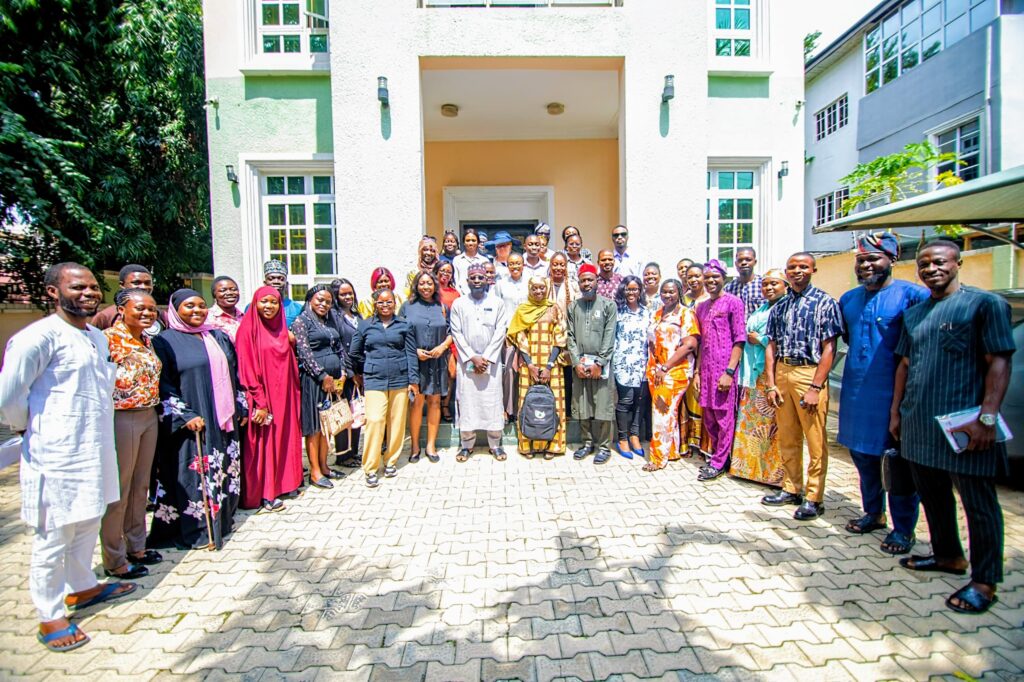
Nigeria’s 2025 VNR at the HLPF: National Progress, Youth Voices and Sydani’s Engagement
By Lasisi Godwin
The 2025 United Nations High-Level Political Forum (HLPF) on Sustainable Development served as a pivotal platform for nations to present their Voluntary National Reviews (VNRs), reflecting on progress, challenges, and opportunities in achieving the Sustainable Development Goals (SDGs). For Nigeria, this year’s VNR its third since 2017, demonstrated a deepened commitment to a whole-of-government and whole-of-society approach, with a thematic focus on five priority goals: Good Health and Well-being (SDG 3), Gender Equality (SDG 5), Decent Work and Economic Growth (SDG 8), Life Below Water (SDG 14), and Partnerships for the Goals (SDG 17)¹.
Over the last decade, Nigeria has embedded the SDGs into national and sub-national development frameworks such as the Economic Recovery and Growth Plan (2017–2020), the Medium-Term National Development Plan (2021–2025), and Nigeria’s Agenda 2050². Significant institutional achievements include strengthening the National Statistical System, establishing coordination platforms like the Presidential Council on the SDGs, and launching the Integrated National Financing Framework (INFF)³.
However, the 2025 VNR revealed mixed progress. According to the 2024 SDG Progress Report, Nigeria has advanced in 18 of 52 key indicators, stagnated in 16, and regressed in another 18⁴. Persistent challenges include multidimensional poverty affecting 63% of the population, undernutrition with child stunting at 40%, limited social protection coverage (11%), and energy access gaps leaving 92 million Nigerians without electricity⁵. In health, while under-five mortality declined from 132 to 110 per 1,000 live births between 2018 and 2023–2024, maternal health indicators worsened, with antenatal care coverage by skilled providers dropping from 67% to 63%⁶.
Youth Inclusion Through the Shadow Report
Complementing Nigeria’s official VNR was the Youth Shadow Report, coordinated by the Network of Youth for Sustainable Development Goals (NGYouthSDGs) and Youth Hub Africa through a consultation and validation process Sydani Group was a part of represented by Godwin Lasisi. This process engaged over 1,000 young Nigerians from diverse demographics urban and rural communities, students, entrepreneurs, workers, and marginalized groups to articulate their lived experiences, concerns, and recommendations⁷.
Key findings from the Youth Shadow Report revealed areas for intensified commitment to ensure development. The Youth Shadow Report revealed that under SDG 3 (Health), young Nigerians find services largely unaffordable and inaccessible, particularly in mental and reproductive health; under SDG 4 (Education), curricula remain outdated, with persistent rural–urban disparities in access; for SDG 8 (Employment), high unemployment forces many into necessity-driven self-employment; under SDG 9 (Digital Divide), rural and female youth face disproportionate barriers to digital access; for SDG 14 (Climate Action), only 22.9% of youth have engaged in climate-related initiatives; and under SDG 16 (Governance), a majority (58%) report feeling unsafe or excluded from political processes⁷
The Youth Shadow Report underscores the need for policy responsiveness that is not only data-driven but also reflective of the aspirations of Nigeria’s burgeoning youth population, over 60% of whom are under 25⁸.
Sydani’s Participation and Alignment with SDG Priorities
Sydani Group’s attendance at the Youth Shadow Report presentation reinforced its commitment to advancing SDG-aligned development, particularly in health systems strengthening and governance reform. Through its technical assistance to the Basic Health Care Provision Fund (BHCPF), Sydani is addressing youth-identified priorities for accessible, affordable health care, including reproductive and mental health services⁷.
Moreover, Sydani’s broader engagement in education, data systems, and programme monitoring supports evidence-based tracking of SDG progress, a core element of the VNR process. Its work in health financing reform and governance aligns with global development agendas for more transparent, participatory policy processes.
A Shared Development Agenda
Nigeria’s 2025 SDG VNR and Youth Shadow Report together highlight the progress Nigeria has made in building institutional capacity, expanding digital infrastructure, and fostering multi-stakeholder engagement. Yet, they also reveal the scale of work required to meet the 2030 deadline, especially in tackling persistent poverty, inequality, and service access gaps.
At Sydani, the alignment between its programmes and youth-identified priorities strengthens its role as a credible partner in Nigeria’s SDG journey. By integrating evidence from both the official VNR and the grassroots-driven Youth Shadow Report, Sydani can continue shaping interventions that are technically sound, inclusive, and responsive to the aspirations of young Nigerians.
As the HLPF reminds us annually, achieving the SDGs is a collective endeavor, one where the energy and insights of youth, coupled with institutional expertise and national commitment, can accelerate progress toward a more equitable, sustainable future for all Nigerians where Universal Health Coverage is a lived reality for all and no one is left behind.
References
- Office of the Senior Special Assistant to the President on SDGs. (2025). Nigeria’s Third Voluntary National Review (VNR) 2025. https://sustainabledevelopment.un.org/content/documents/voluntarynationalreview2025nigeria.pdf
- Office of the Senior Special Assistant to the President on SDGs. (2025). Nigeria’s Third Voluntary National Review (VNR) 2025, Policy and Institutional Frameworks section. https://sustainabledevelopment.un.org/content/documents/voluntarynationalreview2025nigeria.pdf
- United Nations Development Programme Nigeria. (2022). Nigeria launches Integrated National Financing Framework for Sustainable Development. https://www.undp.org/nigeria/press-releases/nigeria-launches-integrated-national-financing-framework
- Office of the Senior Special Assistant to the President on SDGs. (2025). Nigeria SDG Progress Report 2024. https://sdgs.gov.ng/progress-report-2024
- National Bureau of Statistics. (2022). Nigeria Multidimensional Poverty Index (MPI) 2022. https://www.nigerianstat.gov.ng/elibrary/read/1240936
- National Population Commission & ICF. (2024). Nigeria Demographic and Health Survey 2023–24 Key Indicators Report. https://dhsprogram.com/pubs/pdf/PR149/PR149.pdf
- Network of Youth for Sustainable Development Goals. (2025). Nigeria SDG VNR Youth Shadow Report 2025. https://ngyouthsdgs.org/youth-shadow-report-2025
- United Nations Population Fund. (2024). World Population Dashboard – Nigeria. https://www.unfpa.org/data/world-population/NG

